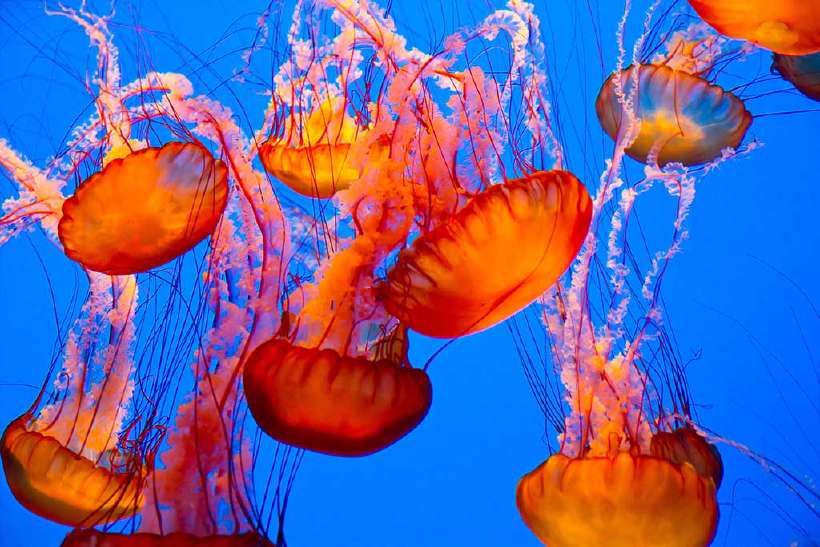How Do Fish Survive in Icy Waters?
Home / Science for Kids / 5Ws & H For Kids / How Do Fish Survive in Icy Waters?
In cold winter months, lakes and rivers freeze over forming ice. Yet, fish and other aquatic animals manage to survive.
Animals like seals, penguins, walruses and a wide variety of sea birds are all fish eaters. They live in the Arctic and Antarctic Circle, amidst the icecaps. The land is completely frozen. Yet these animals manage to live in this region. How do they do it?
The icy waters of the Arctic and Antarctic Oceans support a great amount of marine life. For millions of years life has remained unchanged, making it possible for these animals to adapt themselves to these particular patterns of existence.
But they do get some help from nature. All liquids have a boiling point and a freezing point. When water boils at a certain temperature it turns into steam. When it is cooled to a certain temperature it freezes and becomes ice. Water boils at 100 degree Celsius (100 °C) and freezes at 0 °C. When the outside temperature falls below the freezing point of water, lakes and rivers get frozen.
However, only the top layer of the lake or river freezes. Underneath the frozen upper layer, the water remains in its liquid form and does not freeze. Also, oxygen is trapped beneath the layer of ice. As a result, fish and other aquatic animals find it possible to live comfortably in the frozen lakes and ponds.
But why doesn’t the entire body of water freeze, like a giant, lake-sized ice-cube? Generally, all liquids expand on heating, but water is an exception to this rule. If water is heated, its volume gradually decreases. (This decrease in volume continues till the temperature rises to 4 °C.) At temperatures over 4 °C water starts expanding. It then keeps expanding with the further rise in temperature, till finally at 100 °C it turns into steam.
In other words, at 4 °C, water has the least volume (occupies the least amount of space) and maximum density (is at its heaviest). This irregular expansion of water is called anomalous expansion. This anomalous expansion plays an important role by only freezing the upper layer in lakes and rivers.
![How Do Fish Survive in Icy Waters? [Illustration by Sudheer Nath]](/media/5wh-25_1_hu472bef00ce646078a78bce9cc60183ed_6604_320x0_resize_q60_box.gif)
During winter months in colder countries the outside or atmospheric temperature is very low – it drops to below freezing – and the upper layers of water in the lakes and ponds start cooling. When the temperature of the surface layers falls to 4 °C, the water body acquires maximum density and sinks down. The water that sinks down displaces water below, and the lower layers of water simultaneously rise up. This also gets cooled to 4 °C and again sinks down.
When the temperature of the water body finally goes below 4 °C, the density or heaviness of water decreases and as a result water does not sink down. The surface water finally freezes at 0 °C while the lower part still remains at 4 °C. The light frozen layer of ice floats on top.
Ice does not allow heat to pass through it easily, so the freezing of the waters below is a very slow process. At depths below 30 metres, temperatures are cold and stable, but food is scarce. As a result animals have adapted to this situation by growing more slowly.
There are other dangers that fish face in freezing waters – like death. The body fluid of an ordinary fish can solidify if the temperature of the surrounding water drops below -5 °C. So Arctic and Antarctic fish have adjusted to their surroundings in an interesting manner.
Certain species of cod, flatfish and polar fish have a reduced metabolic rate and produce antifreeze molecules called glycoprotein to reduce the freezing point of their body fluids. One could look at it as the fishy version of bears hibernating, a survival tactic that has seen these finned friends outlive many other creatures on Earth.
661 words |
6 minutes
Readability:
Grade 7 (12-13 year old children)
Based on Flesch–Kincaid readability scores
Filed under: 5ws and h
Tags: #jellyfishes, #rivers, #antarctic, #temperature, #arctic, #lakes
You may also be interested in these:
When will the Oceans of the Earth Overflow?
The Lake and the Birds
What are Canal Locks?
Something Special
Banaras The Eternal City